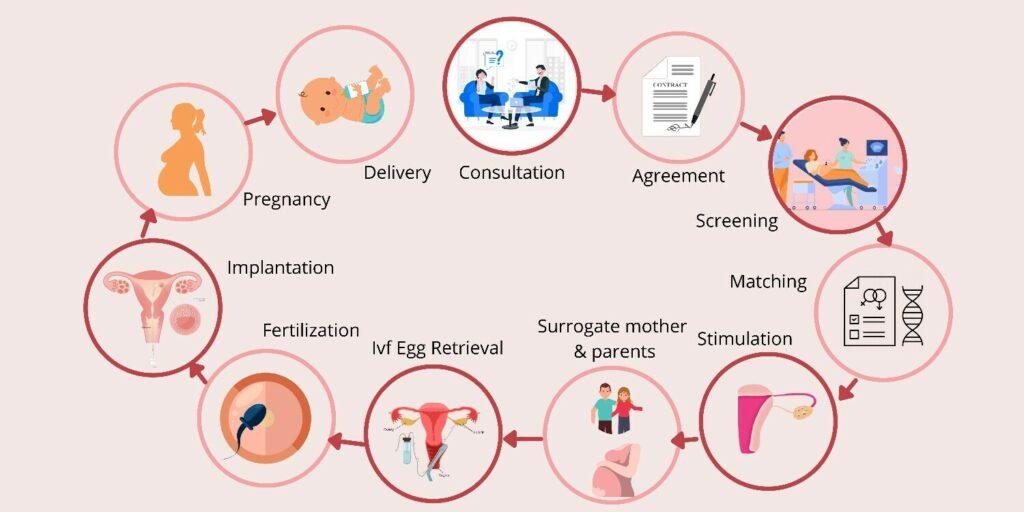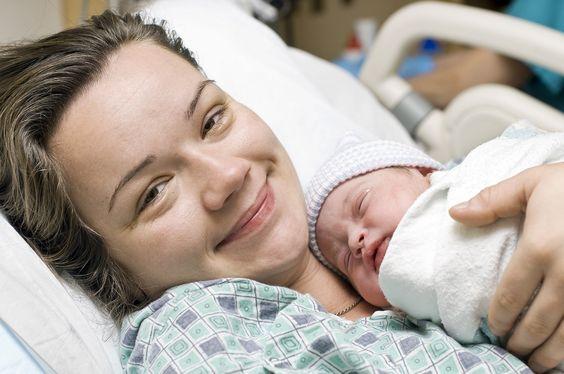- Best Certified & Top Accredited Surrogacy Center.
- Surrogacy program starting at lower Cost $55,000
- Guaranteed Surrogacy with assisted Gamete Donors package available
- Healthiest surrogate at the lowest expenses $20,000
- World- Class fertility facilities just under its roof
- Free first consultation: Book an appointment
- Call/W : 919311850412 Email: info@fertilityworld.in
Surrogacy is a complex series of procedures whereby a young healthy woman (Surrogate mother) agrees to carry a child for those intended (parents, couples, single parents and, LGBTQ communities) to hand over the child to them after delivery, fulfilling their dreams of parenthood. In Canada, surrogacy is regulated by the federal with the principles:
- With the AHR Act, the children’s health & well-being must come first;
- Appropriate measures to help protect the health, safety, dignity, and rights of people affected by the use of AHR technologies;
- Because women, not men, are more significantly affected by AHR technologies, their health must be protected;
- Free and informed consent must always be given before these technologies can be used;
- People who use AHR technologies must not be discriminated against;
- Commercial trade and abuse of the reproductive capabilities of children, women, and men is, for health and ethical reasons, a crime;
- Preservation and protection of human individuality and diversity must be upheld.
Why Surrogacy requires Legal Laws in Canada?
Today, Surrogacy has become a common practice for those intended people, the child is born every two seconds across the World. Therefore, every state has its regulations controlling surrogacy legalities.

Likewise in Canada, the relevant legislation and legal issues arising out of surrogacy agreements are complicated and the penalties for failing to abide by the laws regarding assisted human reproduction (AHR) in Canada can be very severe. As soon as you are seriously considering Surrogacy in building your family, consult with The Fertility World qualified fertility lawyer.
Let’s discuss whether surrogacy is legal or illegal in Canada
Yes, surrogacy is legal in Canada contrary to other people’s beliefs. The Assisted Human Reproduction Act (AHRA) is federal legislation that sets out activities that are permitted and those that are prohibited in consideration to a woman for acting as a surrogate altogether.
What is permitted & prohibited in the AHR act Canada?
The Assisted Human Reproduction act states that:
- Surrogacy is permitted in Canada
- It is illegal to compensate a surrogate mother for her services.
- It is legal to reimburse a surrogate mother for her reasonable expenses incurred as a result of the surrogacy.
- Compensation or an offer of compensation to a woman acting as a surrogate is prohibited under law and subject to serious penalty.
- If a woman has had her children and wishes to carry a child for another family, becoming a surrogate mother in Canada is a legal and viable option.
- You Must Have a Surrogacy Agreement Before Initiating Pregnancy
- It requires that a surrogacy agreement is in place.
- It also requires that the surrogate have independent legal advice on the agreement before signing it.
- Advising or persuading a woman to become a surrogate mother, or do any medical procedure to help a woman become a surrogate mother, knowing or having reason to believe that the woman is under 21 years of age.
Under the AHR Act, the surrogate mother is a woman to surrender the child after birth. She carries your embryo or a fetus in her womb, conceived through an assisted reproduction procedure, and or derived from the genes of a donor or donors. Also, the AHR Act states that these prohibitions (section 6):
- Do not affect the validity under provincial law of any agreement under which a person agrees to be a surrogate mother.
This means that a surrogacy contract must follow the laws of the province where the contract is signed. All of the surrogate’s reimbursable expenses require documentation reports such as receipts and may require written confirmation from a medical professional that the expenses are necessary. This includes:
- The surrogate’s travel to medical appointments;
- The surrogate’s legal fees;
- Counseling services;
- Products or services that are recommended in writing by a doctor or midwife;
- And maternity clothes.
To understand a complete list of eligible expenditures, please consult the Reimbursement related to Assisted Human Reproduction Regulations or the Government of Canada’s guidance on this topic.
What are the statements of the AHR Act in Canada?
The ARH Act states that all surrogacy in Canada must be “altruistic surrogacy”. This means that the surrogate is not allowed to make a profit from being a surrogate. In Canada, surrogates are only permitted to have certain expenses reimbursed or paid for, but not to be paid a salary or otherwise gifted items instead of a salary.
Minimum requirements for intended parents, in Canada?
Extending a family via assisted reproductive technology (ART) is an exciting and memorable journey, yet challenging journey. As an intended parent, understanding the legal guidelines, directing and protecting every step of the way. One should possess the following conditions:
- A written agreement between you and the gestational carrier/surrogate is to be signed before the embryo transfer.
- The birth registration laws of the Province in which the child will be born
- The citizenship and parentage laws of your home country.
What are the minimum Criteria to be a Surrogate in Canada?
Those women considering becoming surrogate mothers in Canada should meet the following requirements, and is it right for you?
- She is a Canadian Citizen or Permanent Resident
- The surrogate should be above 21 years and below 49 years of age,
- Her Body Mass Index (BMI) should be under 35 and up to 40 depending on the clinic.
- She had at least 1 prior pregnancy/birth, or currently nursing a child.
Why are surrogate mothers opted by intended parents?
Today! One out of every 6 couples in Canada is infertile. This infertility is caused by several factors and the intended opt to use a surrogate as an alternative for their family building.
- Women that no longer produce eggs due to ovarian failure/polycystic ovaries, maternal age, ovarian cancer, etc.
- Women with uterus removed due to fibroids, cancer, or accidents.
- Women have had several failed IVF procedures.
- Women that have been diagnosed with a uterine abnormality, congenital abnormalities, Asherman’s Syndrome, myomas/fibroids, polyps, insufficient endometrial linings
- Women suffering from high blood pressure
- Women that suffer from diabetes.
- Women that suffer from a serious heart condition.
- Women that have had recurrent miscarriages, stillbirths, and/or preterm deliveries
- Women under medications that are dangerous to take while pregnant.
- Women that suffer from immune disorders.
- Women that suffered from severe morning sickness
- Women that have suffered from any type of complication could endanger their life or the life of their unborn child.
- Men with ejaculation or disorders affecting sperm production.
- Men who are infertile from the side effects of treatment of testicular cancer.
- Men who have had testicular damage either from injury or infection (such as mumps).
- Men who have a rare genetic or hormone deficiency that causes infertility.
- Couples with unexplained infertility.
- Same-Sex Couples
- Single Intended Parents
- Aging intended parents
Qualifications for Egg Donors in Canada, at Fertility World
Donating or offering an egg to an intended family is an incredible gift. Because you are giving such an amazing gift to a family, there are strict qualifying factors to be an Egg Donor. An egg donor must meet the following conditions to be eligible to be an Egg Donor:
- She has understood the terms and conditions of donors
- A Canadian citizen or permanent resident with active provincial health insurance
- Should be between the age of 20 to 30 years of age
- She is a Non-smoker, and has no recreational drug use (includes marijuana)
- Naturally healthy, with regular menstrual cycles
- She has no significant genetic or hereditary illnesses
- She is free from a history of serious psychological issues
- She is under the Body Mass Index (BMI) of 28 or below
- Willing to take injectable fertility medications
- She has not more than three previous egg retrievals
- Willing to undergo psychological and medical assessments
- Pursuing or completed post-secondary education
Why is the donor egg used in Surrogacy?
Egg donation is often used by intending parents when a woman (partner) whose ovaries have either been surgically removed or are functioning poorly. Poor function of the ovaries can be due to
- premature menopause,
- severe diminished ovarian reserve,
- medical disorders, or exposure to toxins like chemotherapy or radiation therapy.
- Egg donation also is appropriate for women who were born without ovaries.
- To avoid passing down inherited diseases to a woman’s children.
- Women with normal ovulation but who have poor-quality eggs
- women who have had multiple failed IVF cycles,
- women of advanced reproductive age (over age 38) and
- women with a low response to medications for ovarian stimulation.
Qualifications, Conditions for Sperm donors in Canada
Are you conscious of the problem of male infertility and considering donating your sperm? If, so you’re doing an amazing job. However, there is terms and conditions to be qualified to be a Sperm Donor in Canada:
- One must be between the age of 18 to 40 years.
- He must be healthy and fertile
- He has no history of serious illness, hereditary disease
- A sperm donor is not a parent simply under their genetic connection to the child.
Sperm donation is legal in Canada. However, there are various restrictions. Perhaps most notably, across Canada, it is illegal to purchase sperm from a donor or a person acting on behalf of a donor. Sperm donation can happen in a clinic setting or can be done at home through at-home insemination.
Why Donor sperm is Used in Surrogacy?
Insemination using donor sperm has been practiced for over a century. Since the emergence of HIV, donor insemination (DI) has been performed only with frozen and quarantined sperm to allow for time to test the donors. Donor eggs are used when the male partner has severe abnormalities in his semen and or reproductive system, which may be present at birth (congenital) or develop later (acquired) and in other situations such as the following reasons:
- Azoospermia- Absence of sperm due to a blockage
- Obstructive azoospermia- Such as congenital bilateral absence of the vas deferens or previous vasectomy.
- Non-obstructive azoospermia- resulting from exposure to toxins like pesticides, radiation treatment, or chemotherapy.
- Severe oligozoospermia- decreased sperm count or other significant sperm or seminal fluid abnormalities.
- Ejaculatory dysfunction- such as the inability to achieve or maintain an erection or to ejaculate.
- Single women who wish to become parents
- Lesbian couples who desire a pregnancy
Surrogacy is complicated and is a long process, there are federal and provincial laws that apply before, during, and after the birth of a child through surrogacy in Canada, also in most states. Having the right legal counsel is critical to ensure that your surrogacy journey goes smoothly. If you are considering surrogacy in Canada, either as an intended parent, or becoming a donor or a surrogate.
Book an appointment or register with the Fertility World; we would be pleased to assist you with free consultation and up to 10% concession.


